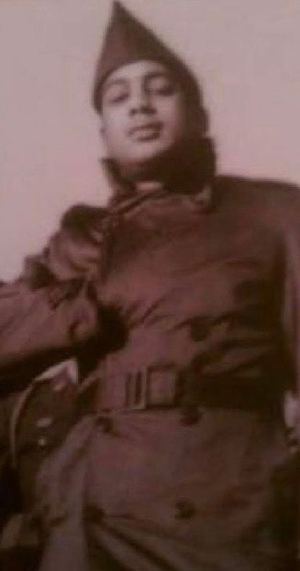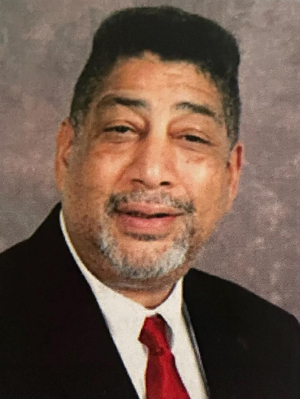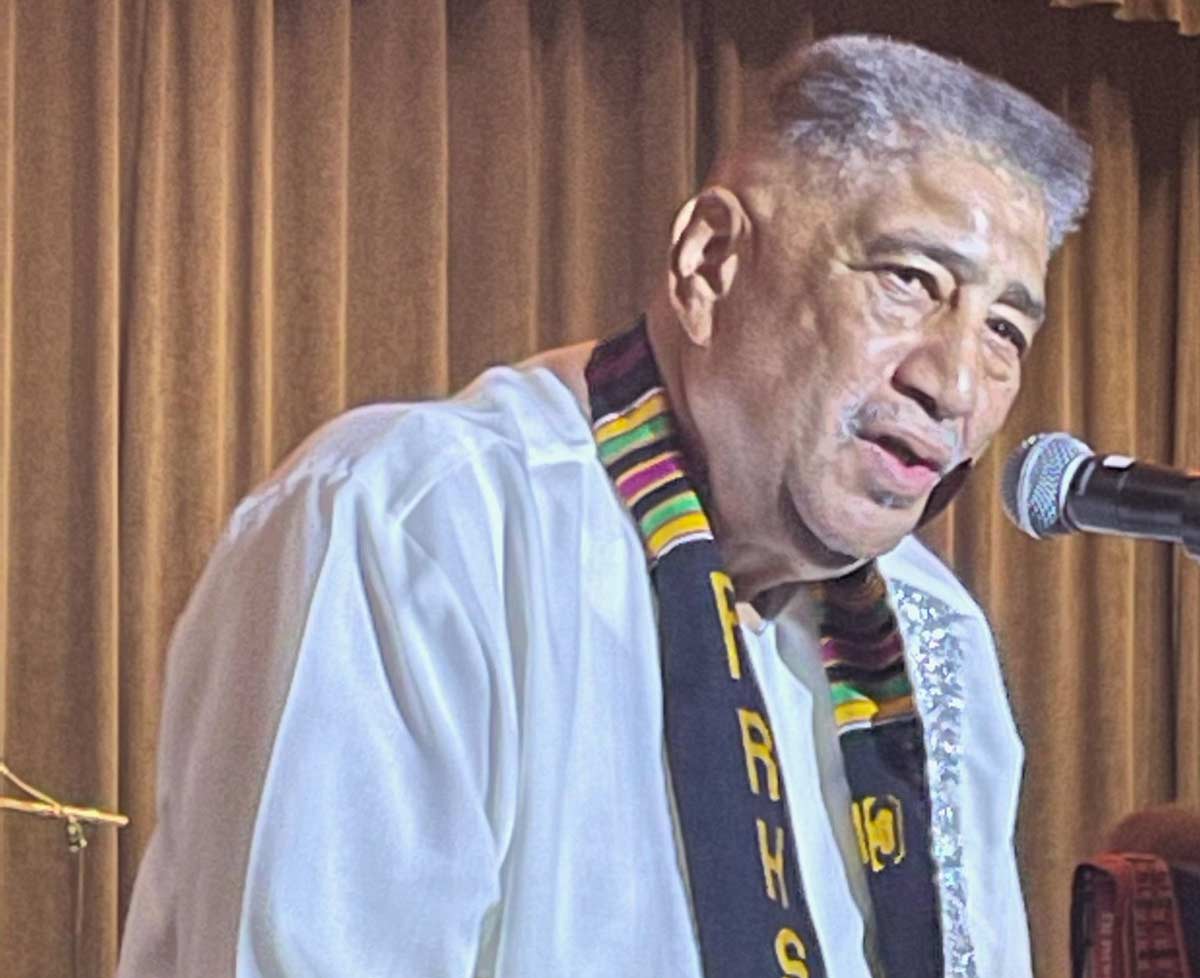2nd in Series of June Men’s Month Stories
By Marlon Rice
One of my earliest recollections of Baba Job Mashariki is of his staunch discipline. It was the Spring of ‘88 or ‘89, and I was in his living room with his sons and a couple of other friends watching Wrestlemania. We were doing what young boys do at that age, watching wrestling and having a ball, when in walks Baba Job from the front door.
He walked into his living room, saw a half dozen boys watching television and horsing around, and spoke in a tone that was as simple as it was definitive.
“It’s time for you to go home.”
Nothing more had to be said. It was time for us to go home.
Maybe a year or so later, I accompanied Black Veterans for Social Justice down to Washington, DC, for a rally. I can’t remember what the rally was for, but again, it was a group of us boys – his sons, myself, and a couple of other boys from the neighborhood. We were maybe 14 or 15 at this time. I can remember that when the bus pulled into its parking space, everyone went silent as Baba Job levied instructions. Another elder came to the back of the bus and gave me and the other boys these earpieces.

We were told that our responsibility was security. I hadn’t thought about being responsible for this road trip; I was just going because my friends were going. But, by the time I got off that bus I had a very real responsibility and a mode of how I was to operate that day.
35 years later, I find myself sitting on the porch of the man who is a grandfather to my two young children, a man who has been a positive and reaffirming reflection of Black Male Leadership to me for most of my life. Today, though, we share laughs as he tells me about his life and the environment and circumstances that shaped him.
Job Mashariki was born January 16, 1943, in Brooklyn, New York, and lived in the heart of Bedford Stuyvesant, right on Clifton Place. He was the second son and one of seven children by Mardesta Mealing, a progressive-minded woman who actually ran for political office in the 57th District. He remembers his community as diverse and tight-knit,
“Bed Stuy was integrated when I grew up. It was a multi-ethnic community. All different races lived here. We had sports and all kinds of stuff that brought us together. We played together, we worked together. I’m not saying that we wouldn’t fight, but there was a collective framework that we shared.”
That paradigm shifted though in the 50’s and 60’s during the era of White Flight. White Flight is the term used to describe the sudden migration of white families from areas that were racially diverse, and the settling of those families into communities that were more racially homogenous, specifically places called suburbs. Baba Job remembers the feeling of that time,
“I remember when some changes began to take place. White folks started moving away. Then, when they returned to visit family or friends, their attitudes were different. We weren’t connected in the same way. We used to eat at each other’s houses and be together. But, that changed.”

A young Job was precocious, and he began to become aware of the disparities that accompany race and class issues in America. He remembers one particular incident from his childhood that sparked questions in him that he would champion as an adult.
“My first understanding of injustice was this Black kid in Brownsville that needed an iron lung. He was sick, and he needed an iron lung to live. He wound up dying because he never got the iron lung. His family didn’t have the money to get the iron lung, but I thought to myself back then that the government had the money to get him the iron lung. Why wouldn’t they do that? Why wouldn’t they provide that for him? It seemed unfair. When I entered the military, it became clear that it was unfair.”
After High School, Baba Job entered the military and was shipped overseas to Germany. And, there, he realized how systemic and unjust racism could be.
“When I went into the military, it became very clear that things were unfair. I would fight with the white soldiers, racist white soldiers, and I would get punished, and the white soldiers wouldn’t. I was very cognizant that a lot of this stuff isn’t just about the individuals, but it was the authorities that enforced racism. My mother ran for political office.
There was always that effort of people trying to work together to bring a more progressive stance. My mother, as poor as we were, she only had two years of college education. But, she came from a family that was very progressive.
That really translated to me. So, in the military, as Blacks, we got together to protect our interests. While I was stationed in Germany, we did some things to raise funds for Dr. King. A meeting was called, and other soldiers were told that they needed to stay away from us because we might be communists because we were raising funds for Dr. King. Of course, they knew that we weren’t communists.
But they used to raise funds for the Salvation Army and for other things, and so what we said was that you put something in there for the Salvation Army, then you can put something in here for Dr. King.”
With a spirit to organize stoked by his upbringing and his experiences in the Armed Forces, Baba Job came home and began applying these sensibilities in his community.
“What I knew was that we need to get young people who are angry, and we need to be able to help them see other paths so that they could express that anger and be productive about it. I would just show up at various meetings, and when I got to talk, I was angry, and so they heard the anger. I went back to school to educate myself and to allow myself opportunities.
Because of my brothers Jitu Weusi and Al Vann, I always stayed with many of those teachers, and they always saw me as being down to teach, but I was more along the lines of Sonny Carson, wanting to organize. I went with them and helped them organize the boycott in Ocean Hill (The Ocean Hill-Brownsville Teachers Strike of 1968). I helped them organize the African-American Teachers Association, which was the Negro Teachers Association.
Vann used to take me around to teachers’ meetings with him. I was also working with Jitu. The East had stepped forward with the young people so I was working over there. I also worked with Yusuf Iman on the cultural piece, and I realized that some of the things his family was putting out there I had to build an understanding because, at that particular point, I had begun to start my own family and how do you deal with family? For this brother, family was all in.”
And while Jitu Weusi and Al Vann were organizing for community control of the schools, Baba Job was coming to the realization of his base.
“I had more of a base because I had gone into the military and had been exposed to the raw racism that exists.”
The positioning of this base and its development started out as a result of a reaction to the killing of Randolph Evans at the hands of Officer Robert Torsney on Thanksgiving Day, 1976.
“I got exposed to Reverend Herbert Daughtery when he was picketing downtown at Abraham and Strauss. Jitu had intersected with him, but this was the first time that I had gotten with him. They were picketing the shooting of Randolph Evans. I went down there and started picketing with them.
So after the picketing, they began holding rallies and discussions at his church, The House of The Lord. One night, Daughtery was talking about people who were considered able to get government help, and when he asked the congregation if anyone knew of anyone who would fall under that consideration, I stood up and said, Yeah, Veterans!
So, what happened from that is that guys that we were working with in The East, or down at Gowanus, or over at the church or with the Black United Front started coming up to me and saying, you’re a veteran?? I’m a veteran, too! We knew one another but didn’t know that we were veterans.
So, after some time organizing these veterans, we decided to have a meeting. We had a meeting down at the East, and we went through the democratic process, and we finally reached the name Black Veterans for Social Justice. There were two of us contending for the leadership position. Me and some other guy that just threw his name in. They elected me. And that’s how it started.”
Black Veterans for Social Justice began its work advocating for veterans in 1977, in a make-shift office on Fulton Street. Baba Job explained how the office came together,
“So, one of the guys, Orlando from the East, owned the building and let us use the space. One of the brothers saw some discarded desks and file cabinets out on Bedford Avenue and Willoughby. He told us, and we went and got it.
We painted it all black, put it in the office and boom, we have an office. And then people started coming to us to discuss their grievances.”
Building an organization from the ground up means creating and implementing a climate of professionalism. And, just like most organizations that start grassroots with the people who are on the ground with you, bad professional habits can creep into the system. Baba Job experienced that in the first days of BVSJ, with employees drinking on the job and random acts of shiftlessness.
“They started drinking and eating lunch in the office, and I had to clear that out. Because I wasn’t doing that stuff. My mother didn’t drink. Even though she had a hard time, she never did that. She maintained herself. So, I never did that. We were dedicated to the work, and I would see how drinking and drugs ruined people both in the movement and in the military. So, I couldn’t accept that. My level of discipline became the organization.
When you come into this place, you have a responsibility to yourself and to your peers to be disciplined, follow instructions, and do what you have to do to keep the organization thriving. You’re the ambassador to the organization. People see the organization through what you do, and you have a responsibility.
Certain policies I put into place to build discipline. Like, if you take off a Monday or a Friday you ain’t getting paid. You aren’t going to party and not handle your responsibilities. Eventually, I had to change that, but even then, you’d have to provide a doctor’s note if you took off a Monday after a weekend.”
Black Veterans for Social Justice recently celebrated its 47th year serving this community. The organization has evolved from strictly veteran advocacy into fighting homelessness through the opening of shelters, job training and placement, and community development. It’s the spirit of discipline and responsibility that Baba Job breathed into the institution that has given it the foundation for the last decades.
It’s the same spirit of discipline and responsibility he instilled in me when I was on that bus in DC as a teen.
